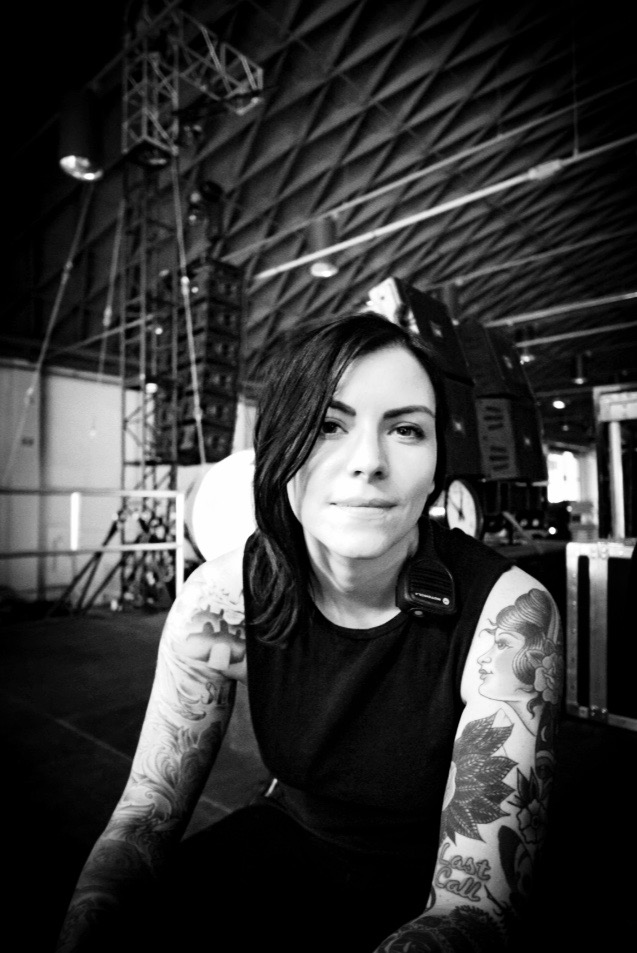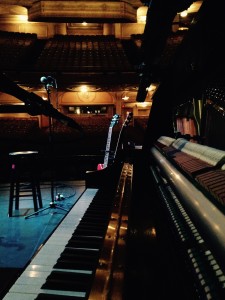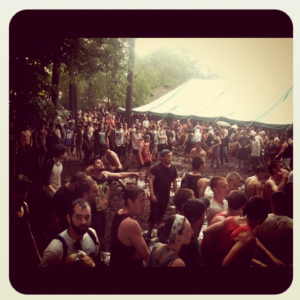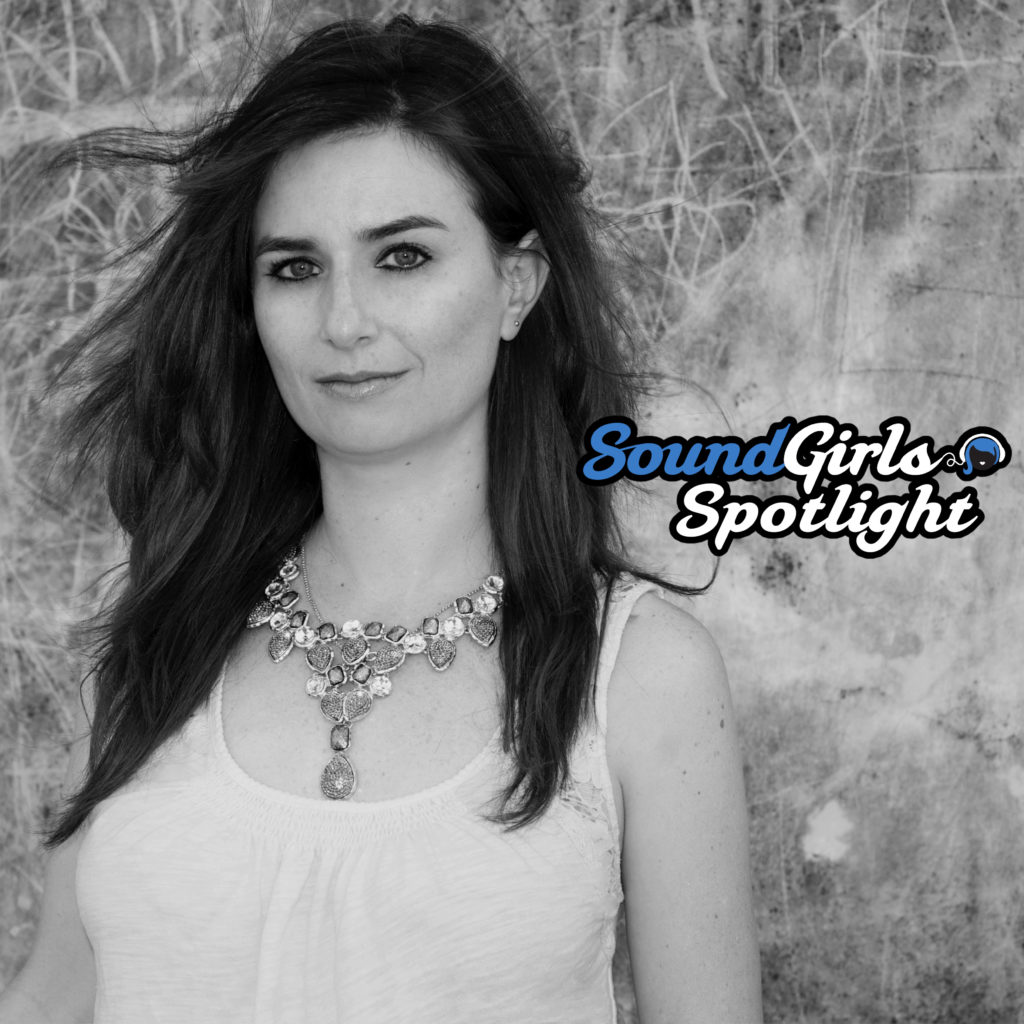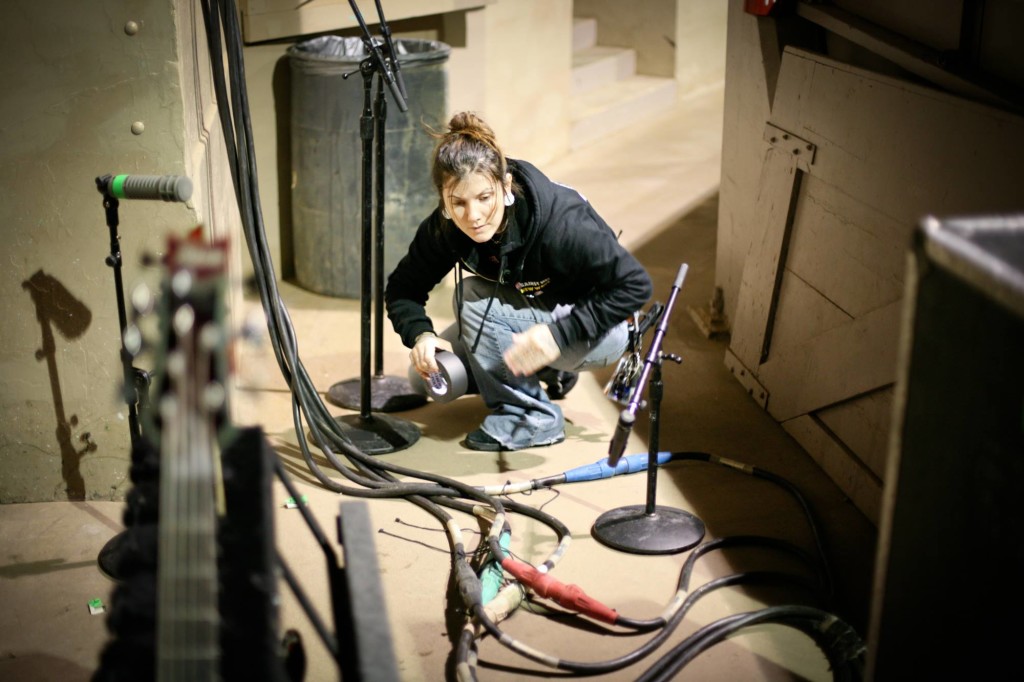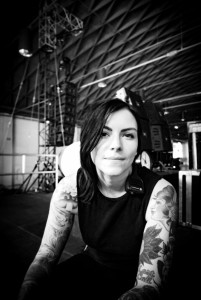 Whitney Olpin has been working in Live Sound for the last six years, working as an Independent monitor engineer and stage manager. She has spent the last year touring with Fitz and the Tantrums. Based in Los Angeles, when she is not on the road she picks up local work through Live Nation.
Whitney Olpin has been working in Live Sound for the last six years, working as an Independent monitor engineer and stage manager. She has spent the last year touring with Fitz and the Tantrums. Based in Los Angeles, when she is not on the road she picks up local work through Live Nation.
Whitney grew up in Utah and took part in church and school choirs as well as the internationally recognized Salt Lake Children’s Choir. She would teach herself piano at age 12. Whitney says she was always interested in music but growing up in Salt Lake her exposure to music was limited. “In middle school, my family moved from Salt Lake City to California, and I suffered complete culture shock. I went from being a Mormon raised, Mariah Carey listening kid to living in mosh pit loving Orange County, CA”.
Whitney remembers during the early 2000s when she was in high school that Orange County had the best alternative music scene –
“It consumed my life, all music — all the time. We’d pile into cars and drive to shows all over Southern California. Sometimes we didn’t even know who was playing. This was before smartphones or iPads; there was no Googling the set times or previewing bands on Spotify first. That wasn’t what it was about. It was about the scene, the music, and the experience. I’d be in the crowd waiting for the next band to start just watching all the techs setting up and checking microphones, etc. I’d see them outside loading the van, talking about where they were going and where they’d been. I made a lot of friends that played in bands locally. I think the first ‘gig’ I ever had might have been loading their drum kits into their trucks or carrying a guitar or two. I just wanted to be part of the action. If it hadn’t been for that music scene, I wouldn’t have all these tattoos, and I’d probably have been a lawyer by now. Sorry, Mom”.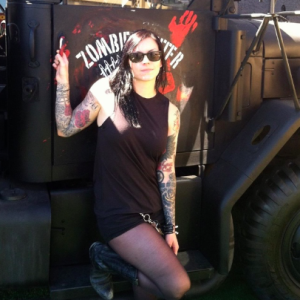
After high school, Whitney would go on to attend college in Orange County. She enrolled as a music major and took a few basic electronics and tech classes for fun. She realized quickly that tech was more her speed and transferred to an audio engineering program in Massachusetts. During this time, she would strike up a friendship with someone who worked at a local theatre, he would recommend her to the local sound company, where she would start working and interning. She also worked as a bartender, a runner, and stage-hand, and sold merch in the local punk/metal scene.
The venues were full of vintage analog gear that would break all the time, and this taught Whitney to be incredibly resourceful. She also learned how small the touring world is, seeing a lot of the same engineers coming through over and over. This allowed her to make some strong connections and friends, a few that she remains in touch with and hits up often for their “Ninja Skills.”
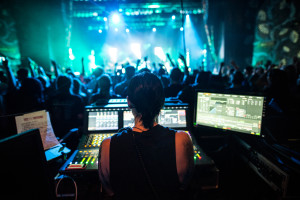 After college, Whitney would move back to Los Angeles and start working at various local venues including the House of Blues Sunset and Saint Rocke. This is where she would learn digital boards and spend a lot of time mixing house and monitors. She was also introduced to mixing new genres Pop, Reggae, Jazz, Country, Hip Hop, Gospel and Acoustic acts. “The House of Blues Sunset was notorious for doing underplays, so I got the opportunity to mix for a lot of big-name artists. It was challenging and exciting”. At Saint Rocke, she would meet sound engineer Grace Royse. A few months later Grace would call asking her to fill in on a gig with Fitz and the Tantrums.
After college, Whitney would move back to Los Angeles and start working at various local venues including the House of Blues Sunset and Saint Rocke. This is where she would learn digital boards and spend a lot of time mixing house and monitors. She was also introduced to mixing new genres Pop, Reggae, Jazz, Country, Hip Hop, Gospel and Acoustic acts. “The House of Blues Sunset was notorious for doing underplays, so I got the opportunity to mix for a lot of big-name artists. It was challenging and exciting”. At Saint Rocke, she would meet sound engineer Grace Royse. A few months later Grace would call asking her to fill in on a gig with Fitz and the Tantrums.
Whitney would hit the road for the first time in the fall of 2015, as a monitor engineer for blues and jazz musician Melody Gardot. “Melody insisted on picking up a different piano in each city for her to play on that night. We never knew what style we would get, and with so many live instruments on stage, that tour kicked my butt. Every place we went, I would sit down and play, move mics, phase reverse, eq, etc. until the piano sounded as natural in the monitors as possible. I can mic that instrument like nobody’s business now! But most importantly, I learned the subtle art of annoying the FOH engineer to death with Journey piano covers. Epic”.
She would move from that tour to Sublime with Rome, where she would work with Grace Royse at FOH. “Switching from jazz to punk was a whirlwind in the best way. I grew up in punk and metal clubs, so this tour felt a lot more like home. The bond between the band and crew is family strong; in fact, I still think that camp is one of the best around”. (Meet the Women Running Sound for Sublime for Rome)
Since then it has been a whirlwind of shows and tours for Whitney. She has done local and fly dates with Dirty Heads as TM/ME, FOH for SWR, and ME for Toni Braxton. She also has mixed monitors for Ms. Lauryn Hill. Whitney’s favorite thing about touring is Learning. “Every time I go out on the road I come face to face with all the technical things I have and haven’t mastered yet. You just can’t get it all from working in a club. I enjoy learning from other engineers on tour and asking their opinions”.
She also loves traveling and finds waking up in a different city invigorating. At the same time, she dislikes the lack of sleep, eating mystery food every day and being away from loved ones. On days off she likes to find a local hiking spot or drops in on a fitness class.
“When I first got started I remember hearing a lot of warnings from other people, like get out of this industry while you still can’ and stories of smelly 15-hour plane rides, sweaty summer tours, overnight load-ins, etc. So I think it’s important to for me write about what keeps the fire burning when the gig gets tough”.
“I remember one of the first shows I mixed monitors for; it was on Warped Tour, on a local stage in Boston, MA. It started pouring rain, and all the other stages shut down, but our stage was totally covered with tarps, so the singer looked at me like, ‘fuck it, I’m gonna keep going.’ So I ran out, flipped all the wedges over, and they kept playing. Since all the other stages were closed, all the fans started following the music to our stage. Suddenly this little no-name hardcore band had hundreds of spectators and kids moshing in the mud. I still think back to that moment– this band did it with no monitors in the pouring rain because they love this shit”.
“Sometimes shows don’t go perfectly; mistakes happen, it rains, whatever. I make it a point during every show to breathe and take a minute to take it all in. I take a look out at the crowd and see these fans just losing their minds. I was just like them. I’m still just like them. When times get tough, I remind myself that I got into this for a reason and I’ll keep going for that same reason. Never lose sight”.
Whitney keeps her skills up to date by attending trainings and seminars completing training for Midas, SSL, Soundcraft and Rational Acoustics. She also reads audio books when she has time. She is fascinated by how large-scale events are produced and feels it important to understand it from the production side and touring side. Her future goals include moving into bigger tours with larger productions. She wants to learn more about audio systems, and as much as she loves mixing, she would like to move into system teching.
What if any obstacles or barriers have you faced?
For me, the biggest obstacle has been juggling multiple jobs while building my career. It was scary to walk away from a steady bartending job of eight years, a job I relied upon almost my entire adult life. I used to say it supported my audio addiction.
How have you dealt with them?
In 2014 I quit my bartending job. I was beginning to get more sound gigs and just couldn’t handle the scheduling nightmare anymore. Plus the more audio I did, the more I realized I had outgrown bartending. I didn’t realize it then, but all the years I spent behind the bar would actually make me a better engineer. It taught me fundamental skills like multitasking, maintaining a sense of urgency, speed, and communication.
Advice you have for other women and young women who wish to enter the field?
I don’t really look at myself as a ‘female audio engineer.’ I just think of myself as an engineer. However, I can’t ignore the blaring fact that women make up just a small fraction of this industry both on and off stage. With advances in technology and social media, I think the general public is becoming more aware of live sound engineers. When I get fans asking to take a photo of me at the monitor console after the show because ‘they never see women mixing’ then I know there’s a problem. I’ve straight up had a male engineer tell me thinks girls can’t mix and we can’t hang. I still laugh thinking about it. Haters, unfortunately, are a part of life. I just think of it as fuel for the fire.
My advice for women is the same as it would be for men. Be prepared to work hard and from the bottom up. Get a job at a local venue or studio and be persistent about wanting to move up the ladder. Learn everything you can from everyone you can. Also, “Fake it ‘til you make it” never worked for me. Don’t let your pride get in the way of asking dumb questions. That’s how you learn. It’s amazing how far, “Hey, your mix sounds great. What are you doing on that vocal effect?” goes over. We’re all nerds at heart, and from my experience, we all love to geek out about it; use that to your advantage.
When the time comes, don’t be afraid to accept or reach for gigs that intimidate you. I’m not going to pretend I wasn’t apprehensive about some of the shows I’ve mixed, but some of them led to more significant opportunities. I’m still trying to master the art of not psyching myself out. I’ve been in multiple situations where an engineer couldn’t make the show, and I got to mix, which in turn led to future gigs. Don’t let self-doubt hold you back.
Must have skills?
Signal flow, signal flow, signal flow. Cable management. Maintaining composure. Attention to detail. A strong sense of self-awareness. People skills. A sense of humor. Integrity. As a monitor engineer specifically, having the ability to gain and maintain an artist’s trust is paramount.
Favorite gear?
I’ve admittedly never been much of a gear head. I learned on the basis of ‘make it work with what you have,’ but there are a few pieces I really can’t live without. One is RF coordination software (currently I use Vantage and Shure Wireless Workbench) and a good spectrum analyzer (I tour with an RF Venue Rackpro and a handheld RF Explorer). No kidding, there have been shows I couldn’t have gotten through without them. Also my JH Roxanne In-Ear Monitors. They have an adjustable bass feature and sound better than any other IEMs I’ve tried. The cables are also easy to repair on the fly if need be.
Parting Advice:
Whitney’s offers this advice to those wanting to go into audio I knew early on that I wanted to go to school for music technology but had trouble finding a good fit, program wise. I think society imposes this idea that you need to get a degree, so I shied away from anything that didn’t offer one. In retrospect, I wish I hadn’t. When anyone asks me what I think of audio schools I tell them what one of my engineer friends said to me once, “ You could’ve bought a console with that money!” That has always stuck. He’s right. Look, I’m not saying school isn’t important. Just be wise in what you choose. Maybe take a workshop and see if it really interests you before you jump in. I believe strongly in music performance and electronics degrees, but audio engineering can be learned on the job. I got book smart in school and street smart at the venue. There’s no reason you can’t do both economically”
Everyone’s journey in audio is different, and opportunities arise when you least expect them. My best advice is whatever path you choose, make sure you live every moment. Get the most out of every relationship and connection you make along the way. I’ve been doing audio for only six years now, but not once has someone looked at my resume. I would be ignorant to say I’ve gotten to where I am all on my own. I’ve always gotten gigs by endorsement from someone I know who has a little faith in me. Trust me when I say it counts to call and check in with the people who were there from the beginning. The ones that make you re-wrap all your cables because you do it wrong, or call you out because your mix sucks. Embrace the tough love. It might sting in the moment, but they are preparing you for the battles ahead. There are a few of these engineers in my life that I will always look up to. They are constantly setting the bar higher and higher. Surround yourself with people that inspire you, and you can do great things.
We caught up with Whitney in August of 2019:
Since talking about her touring in the original interview, she continued to tour with other acts like Sofi Tukker, X Ambassadors and Walk the Moon. She currently mixes monitors at the iHeartRadio Theater in Burbank and production manages for Live Nation Clubs & Theaters in Los Angeles.
